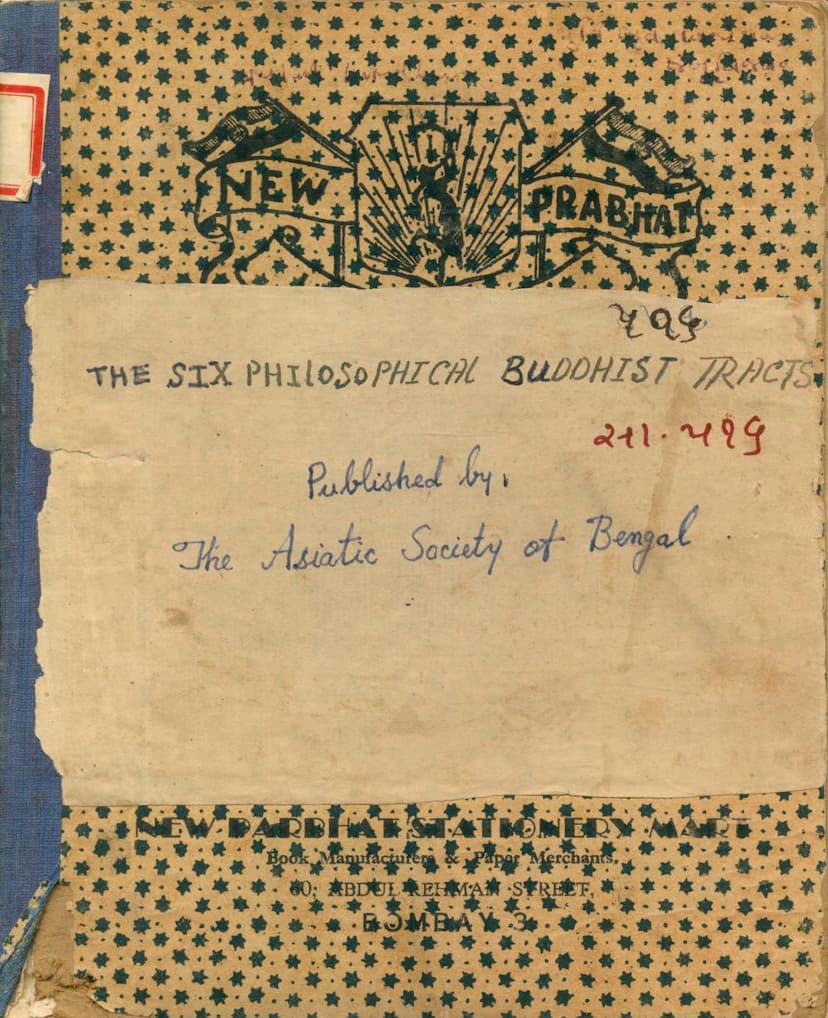Six Philosophical Buddhist Tracts
Added to library: September 2, 2025

Summary
This collection, titled "The Six Philosophical Buddhist Tracts," published by the Asiatic Society of Bengal, presents a compilation of significant philosophical works attributed to Buddhist scholars. The tracts delve into complex philosophical arguments, primarily focusing on epistemological and metaphysical issues relevant to Buddhist thought.
The book contains six tracts:
-
Apoha-siddhi (Proof of Exclusion): Authored by Ratnakirti, this tract is a detailed exploration of the concept of apoha, a key tenet in Buddhist epistemology, particularly within the Dignaga-Dharmakirti tradition. Apoha asserts that conceptualization and linguistic meaning arise from the exclusion of what is not the object of cognition or speech. The author engages in a rigorous debate, refuting various philosophical positions (including those of Bhatta, Vācaspati, and possibly others like Kumarila) that oppose or misunderstand the apoha theory. The tract meticulously analyzes the nature of meaning, the relationship between words and concepts, and the process by which negations lead to positive understanding, all within the framework of apoha. It discusses how words signify things by excluding what they are not, arguing that this exclusionary function is fundamental to knowledge and language.
-
Kshanabhaṅga-siddhi (Proof of Momentariness): Also by Ratnakirti, this tract argues for the momentariness of all phenomena (kshanabhaṅga). It posits that reality is characterized by constant flux, with things arising and ceasing to exist in an instant. The author defends this doctrine against opposing views, particularly the realist theories of the Naiyāyikas, who adhere to the existence of enduring substances and causal relationships across time. Ratnakirti employs logical reasoning, including the use of vyapti (invariable concomitance) and hetu (reason), to demonstrate that momentariness is a necessary consequence of the nature of causality and the impermanence of all conditioned existence. He critiques notions of enduring substances and challenges the possibility of causal efficacy in things that are not momentary.
-
Anvayadvaya-kshanabhaṅga-siddhi (Proof of Momentariness by Way of Twofold concomitance): This is another work by Ratnakirti, seemingly related to the previous tract, focusing on proving momentariness through a twofold application of vyapti (invariable concomitance) and its implications. The title suggests a more nuanced or dual approach to establishing the momentariness of reality.
-
Vyabhicāra-pratishedha (Refutation of Deviation): This tract, possibly also by Ratnakirti or a related scholar, aims to refute the concept of vyabhicāra (deviation or fallacy in inference), which is a crucial element in logical reasoning. By demonstrating that certain deviations are untenable, the author likely strengthens the validity of Buddhist logical methods, potentially in support of doctrines like momentariness or apoha.
-
Pramāṇa-vinirākaraṇa (Refutation of Pramāṇas): Attributed to Pandita Ashokapranita, this tract critically examines the validity and scope of pramāṇas (means of valid knowledge) within different philosophical schools. The author likely scrutinizes established epistemological frameworks, possibly challenging or reinterpreting the role of perception (pratyaksha) and inference (anumāna), and perhaps critiquing the realist assumptions underlying some pramāṇas.
-
Antarvyāpti-samarthana (Support for Internal Concomitance): Authored by Ratnakarashanti, this tract focuses on the concept of antarvyāpti (internal concomitance). This likely pertains to establishing logical connections and relationships that are inherent or internal to the nature of reality or concepts, rather than relying solely on external correlations. The author would be defending the validity of such internal logical relationships, perhaps in relation to Buddhist doctrines like momentariness or emptiness.
The Preface provides context, highlighting the "philosophical language" and "best period" of these Sanskrit Buddhist works. It contrasts their conciseness and directness with the "diffuse and verbose" earlier literature and the "enigmatic and algebravical" style of later scholars. The Preface also offers insights into the historical context, mentioning scholars like Kumarila, Sankara, Udayana, Dharmottara, and Vacaspati, and attempts to date Ratnakirti and other commentators. It notes Ratnakirti's "bitter" refutations of Dharamottara and Vacaspati Misra, placing him around the end of the 10th century and a younger contemporary of Vacaspati Misra. The Preface also mentions Ratnakirti's other works, including Sthirasiddhidusana and Chitradevasiddhi.
The collection emphasizes the analytical and argumentative nature of Buddhist philosophy, engaging with core concepts of meaning, reality, causality, and valid knowledge through rigorous debate and logical refutation of opposing viewpoints.